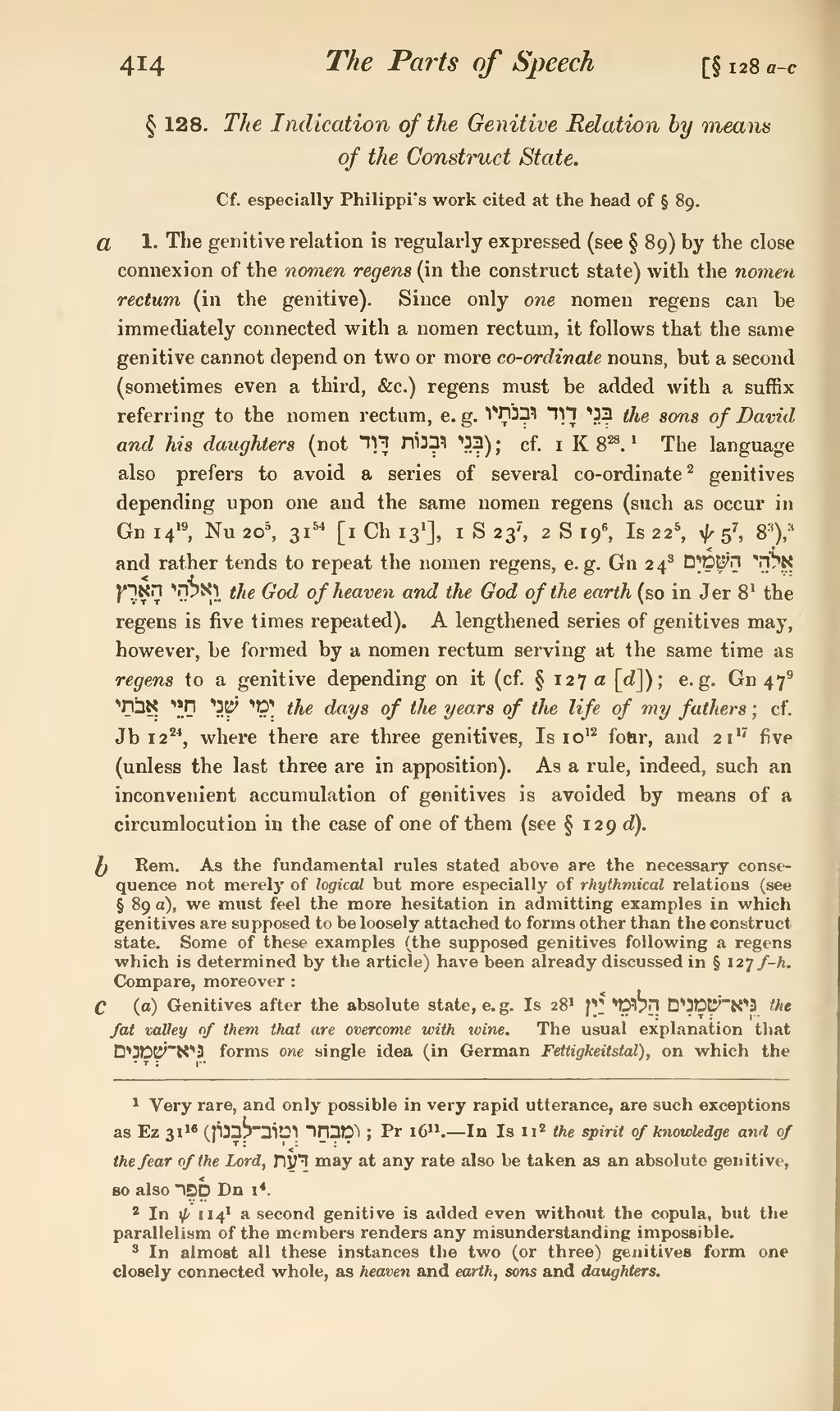[a] 1. The genitive relation is regularly expressed (see § 89) by the close connexion of the nomen regens (in the construct state) with the nomen rectum (in the genitive). Since only one nomen regens can be immediately connected with a nomen rectum, it follows that the same genitive cannot depend on two or more co-ordinate nouns, but a second (sometimes even a third, &c.) regens must be added with a suffix referring to the nomen rectum, e.g. בְּנֵי דָוִד וּבְנֹתָיו the sons of David and his daughters (not בְּנֵי וּבְנוֹת דָּוִד); cf. 1 K 8.[1] The language also prefers to avoid a series of several co-ordinate[2] genitives depending upon one and the same nomen regens (such as occur in Gn 14, Nu 20, 31 [1 Ch 13], 1 S 23, 2 S 19, Is 22, ψ 5, 8),[3] and rather tends to repeat the nomen regens, e.g. Gn 24 אֱלֹהֵי הַשָּׁמַ֫יִם וֵֽאלֹהֵי הָאָ֫רֶץ the God of heaven and the God of the earth (so in Jer 8 the regens is five times repeated). A lengthened series of genitives may, however, be formed by a nomen rectum serving at the same time as regens to a genitive depending on it (cf. § 127 a [d]); e.g. Gn 47 יְמֵי שְׁנֵי חַיֵּי אֲבֹתַי the days of the years of the life of my fathers; cf. Jb 12, where there are three genitives, Is 10 four, and 21:17 five (unless the last three are in apposition). As a rule, indeed, such an inconvenient accumulation of genitives is avoided by means of a circumlocution in the case of one of them (see § 129 d).
[b] Rem. As the fundamental rules stated above are the necessary consequence not merely of logical but more especially of rhythmical relations (see § 89 a), we must feel the more hesitation in admitting examples in which genitives are supposed to be loosely attached to forms other than the construct state. Some of these examples (the supposed genitives following a regens which is determined by the article) have been already discussed in § 127 f–h. Compare, moreover:
[c] (a) Genitives after the absolute state, e.g. Is 28 גֵּֽיא־שְׁמָנִים הֲלוּמֵי יַ֫יִן the fat valley of them that are overcome with wine. The usual explanation that גֵּֽיא־שְׁמָנִים forms one single idea (in German Fettigkeitstal), on which the
- ↑ Very rare, and only possible in very rapid utterance, are such exceptions as Ez 31 (מִבְחַר וְטֽוֹב־לְבָנוֹן); Pr 16.—In Is 11 the spirit of knowledge and of the fear of the Lord, דַּעַ֫ת may at any rate also be taken as an absolute genitive, so also סֵ֫פֶר Dn 1.
- ↑ In ψ 114 a second genitive is added even without the copula, but the parallelism of the members renders any misunderstanding impossible.
- ↑ In almost all these instances the two (or three) genitives form one closely connected whole, as heaven and earth, sons and daughters.

